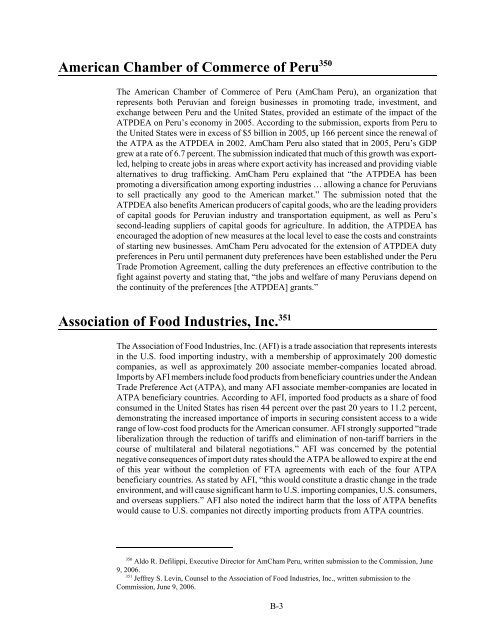The Impact of the Andean Trade Preference Act Twelfth ... - USITC
The Impact of the Andean Trade Preference Act Twelfth ... - USITC
The Impact of the Andean Trade Preference Act Twelfth ... - USITC
- No tags were found...
You also want an ePaper? Increase the reach of your titles
YUMPU automatically turns print PDFs into web optimized ePapers that Google loves.
American Chamber <strong>of</strong> Commerce <strong>of</strong> Peru 350<strong>The</strong> American Chamber <strong>of</strong> Commerce <strong>of</strong> Peru (AmCham Peru), an organization thatrepresents both Peruvian and foreign businesses in promoting trade, investment, andexchange between Peru and <strong>the</strong> United States, provided an estimate <strong>of</strong> <strong>the</strong> impact <strong>of</strong> <strong>the</strong>ATPDEA on Peru’s economy in 2005. According to <strong>the</strong> submission, exports from Peru to<strong>the</strong> United States were in excess <strong>of</strong> $5 billion in 2005, up 166 percent since <strong>the</strong> renewal <strong>of</strong><strong>the</strong> ATPA as <strong>the</strong> ATPDEA in 2002. AmCham Peru also stated that in 2005, Peru’s GDPgrew at a rate <strong>of</strong> 6.7 percent. <strong>The</strong> submission indicated that much <strong>of</strong> this growth was exportled,helping to create jobs in areas where export activity has increased and providing viablealternatives to drug trafficking. AmCham Peru explained that “<strong>the</strong> ATPDEA has beenpromoting a diversification among exporting industries … allowing a chance for Peruviansto sell practically any good to <strong>the</strong> American market.” <strong>The</strong> submission noted that <strong>the</strong>ATPDEA also benefits American producers <strong>of</strong> capital goods, who are <strong>the</strong> leading providers<strong>of</strong> capital goods for Peruvian industry and transportation equipment, as well as Peru’ssecond-leading suppliers <strong>of</strong> capital goods for agriculture. In addition, <strong>the</strong> ATPDEA hasencouraged <strong>the</strong> adoption <strong>of</strong> new measures at <strong>the</strong> local level to ease <strong>the</strong> costs and constraints<strong>of</strong> starting new businesses. AmCham Peru advocated for <strong>the</strong> extension <strong>of</strong> ATPDEA dutypreferences in Peru until permanent duty preferences have been established under <strong>the</strong> Peru<strong>Trade</strong> Promotion Agreement, calling <strong>the</strong> duty preferences an effective contribution to <strong>the</strong>fight against poverty and stating that, “<strong>the</strong> jobs and welfare <strong>of</strong> many Peruvians depend on<strong>the</strong> continuity <strong>of</strong> <strong>the</strong> preferences [<strong>the</strong> ATPDEA] grants.”Association <strong>of</strong> Food Industries, Inc. 351<strong>The</strong> Association <strong>of</strong> Food Industries, Inc. (AFI) is a trade association that represents interestsin <strong>the</strong> U.S. food importing industry, with a membership <strong>of</strong> approximately 200 domesticcompanies, as well as approximately 200 associate member-companies located abroad.Imports by AFI members include food products from beneficiary countries under <strong>the</strong> <strong>Andean</strong><strong>Trade</strong> <strong>Preference</strong> <strong>Act</strong> (ATPA), and many AFI associate member-companies are located inATPA beneficiary countries. According to AFI, imported food products as a share <strong>of</strong> foodconsumed in <strong>the</strong> United States has risen 44 percent over <strong>the</strong> past 20 years to 11.2 percent,demonstrating <strong>the</strong> increased importance <strong>of</strong> imports in securing consistent access to a widerange <strong>of</strong> low-cost food products for <strong>the</strong> American consumer. AFI strongly supported “tradeliberalization through <strong>the</strong> reduction <strong>of</strong> tariffs and elimination <strong>of</strong> non-tariff barriers in <strong>the</strong>course <strong>of</strong> multilateral and bilateral negotiations.” AFI was concerned by <strong>the</strong> potentialnegative consequences <strong>of</strong> import duty rates should <strong>the</strong> ATPA be allowed to expire at <strong>the</strong> end<strong>of</strong> this year without <strong>the</strong> completion <strong>of</strong> FTA agreements with each <strong>of</strong> <strong>the</strong> four ATPAbeneficiary countries. As stated by AFI, “this would constitute a drastic change in <strong>the</strong> tradeenvironment, and will cause significant harm to U.S. importing companies, U.S. consumers,and overseas suppliers.” AFI also noted <strong>the</strong> indirect harm that <strong>the</strong> loss <strong>of</strong> ATPA benefitswould cause to U.S. companies not directly importing products from ATPA countries.350Aldo R. Defilippi, Executive Director for AmCham Peru, written submission to <strong>the</strong> Commission, June9, 2006.351Jeffrey S. Levin, Counsel to <strong>the</strong> Association <strong>of</strong> Food Industries, Inc., written submission to <strong>the</strong>Commission, June 9, 2006.B-3
















